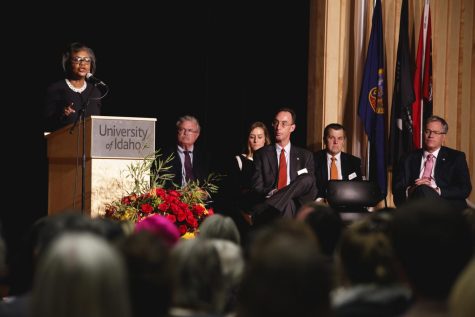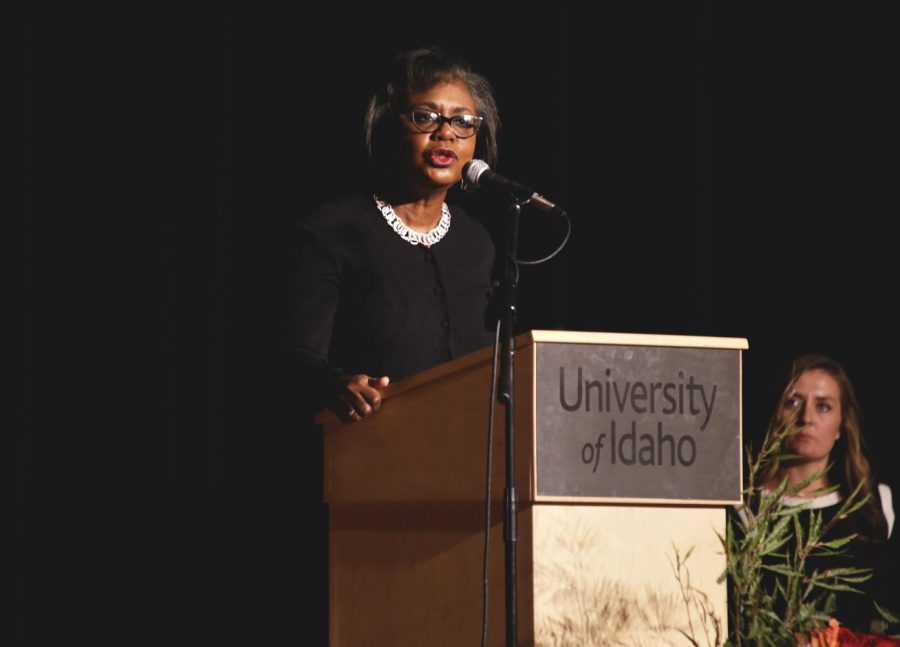Anita Hill lectures on women’s rights
Hill speaks on 26th anniversary of her testimony to the Supreme Court
RYAN PUGH | The Daily Evergreen
U.S. Attorney and women’s rights icon Anita Hill speaks about sexual harassment cases within the judicial system on Wednesday at the University of Idaho.
October 12, 2017
Anita Hill spoke at University of Idaho about women’s rights, 26 years after presenting her sexual harassment testimony against then-Supreme Court Justice nominee Clarence Thomas in front of the Senate.
Greeted by a standing ovation from the crowd at UI on Wednesday, she spoke about equality, intersectionality and the hearings, which happened in 1991.
Hill is currently a professor at Brandeis University, but was thrusted into the national spotlight in 1991, when she described how Thomas had asked her out on dates multiple times.
He used work situations to discuss sexually explicit topics in conversation after she repeatedly refused him, while she worked as his aide for two years while he was the supervisor of the Department of Education and U.S. Equal Employment Opportunity Commission.
She spoke of data’s importance to the practice of law and in holding governments accountable.
“Whether you like it or not, it’s new,” Hill said. “In the university, data can be everything, we use figures to calculate how much we need to improve.”
Hill said in courts, “facts, not the alternative kind” are indicators of fairness and injustice.
Mark Adams, dean of UI’s College of Law, said that the timing was especially important because it was not only the day Hill gave her testimony to the Senate, but also International Day of the Girl Child.
“Twenty-six years ago today,” he said, “likely at this moment, Professor Hill presented her testimony to the Senate Judiciary Committee.”
Adams also said that there are 1.1 billion girls in the world, and that all young women must have the chance and the ability to overcome obstacles that many face on a day-to-day basis.
Hill is one of the lecturers in the Bellwood Memorial Lecture series, which is based in Idaho and brings local, regional and national figures to the UI campus.
The event featured many prominent members of the judicial court system, including Chief Justice Roger S. Burdick of the Idaho Supreme Court and Kent Higgins, president of the Idaho State Bar.

Hill speaks about the progress that has been made since 1991. She recalls how senators questioned and attacked her for her testimony.
Higgins spoke about how a past mentor of his told him how many come to school to learn and grow, how an education was more than a means to an end. He spoke about how the Bellwood Memorial Lectures are essential to growth and development for young minds.
Burdick recalled watching Hill give her testimony when he was a young magistrate judge.
“On behalf of the Supreme Court,” he said, “we are happy to be an eager participant of the Bellwood speakers this year.”
Throughout the presentation, Hill used the topic of data to show how the current administration is impacting minority groups, and why the government must continue to use data to help understand and measure inequalities.
She said that looking at data can help American society to close the gender pay gap and help companies identify unconscious bias and promote best practices.
“In Baltimore, before the 2008 market collapse,” Hill said, “40 percent of new home buyers were single women.”
With this example, Hill said that these women were victims of the most toxic loans during that period. She said that this was one of the examples of how women were treated during this period.
“What we care about, we measure,” Hill said.
Her presentation shifted to how women were treated in the workplace, and the evolution of the views of women in the workplace.
Hill said that six decades ago, President Kennedy created the Equal Pay Act to create better wages for women. Yet, she said, we are still talking about it today.
“If you fast forward to the Obama administration efforts, were are still covering the same issues,” Hill said.
Hill said that President Trump’s election is not the end of the world, and that the world today is much better than that of 1991.
In 1991, the senators presiding over the case, all white men, were “winging” it. They were not ready to have a hearing involving a woman of color such as herself, an African-American woman, Hill said.
“I’ve actually witnessed firsthand what happens to procedure and policy when government bodies dismiss facts,” she said, “and rely on politics and myths of women’s experiences.”
Many of the senators there at the time said she was making up her testimony or were demonically possessed, she said.
“Senator Danforth proposed I was suffering from erotomania,” she said.
Toward the end of her presentation, she shared an experience during the 1991 hearings.
She said she was subpoenaed for her testimony, when Senator Simpson warned Hill that she would face real harassment. Hill recounts how it was a warning to her and to all women who stand against harassment.
“I was warned, I was told what the consequences would be,” she said, “but nevertheless, I persisted.”










